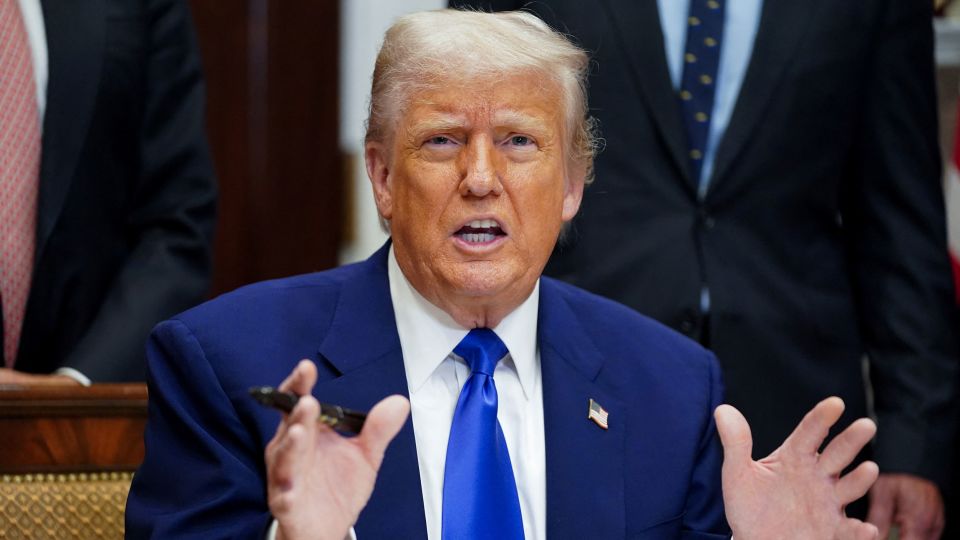President Donald Trump is ratcheting up the pressure on major drugmakers to bring their US prices in line with the far lower ones available to patients in other countries — though industry experts don’t expect the pharmaceutical companies to acquiesce.
Trump sent letters to 17 major pharmaceutical company CEOs on Thursday with a list of demands, including that the manufacturers extend so-called “Most Favored Nation” pricing — the lowest price paid for a drug in a peer country — to all drugs provided to Medicaid enrollees. He also wants the companies to guarantee that Medicaid, Medicare and commercial-market insurers pay such prices for all new drugs. The president gave the companies 60 days to comply.
The directive stems from an executive order Trump signed in May, when he demanded drugmakers start offering US patients those lower prices or face consequences. Prices for some brand name drugs in the US are more than three times those in other developed nations, according to the administration.
In that executive order, he also directed the Department of Health and Human Services to come up with price targets within 30 days. But Trump implied that the discussions between HHS officials and the companies did not yield results that he found acceptable.
“Most proposals my administration has received to ‘resolve’ this critical issue promised more of the same: shifting blame and requesting policy changes that would result in billions of dollars in handouts to industry,” he wrote in the letters, which were posted on Truth Social. “Moving forward, the only thing I will accept from drug manufacturers is a commitment that provides American families immediate relief from the vastly inflated drug prices and an end to the free ride of American innovation by European and other developed nations.”
“But if you refuse to step up, we will deploy every tool in our arsenal to protect American families from continued abusive drug pricing practices,” he continued. “Americans are demanding lower drug prices, and they need them today.”
The May executive order outlined some potential ramifications if manufacturers do not make significant progress in lowering prices. Those included directing HHS to craft a rule implementing the policy, allowing more drug importation into the US, reviewing drug exports, and having the Food and Drug Administration modify or revoke approvals granted for drugs that may be “unsafe, ineffective, or improperly marketed.”
The pharmaceutical industry warned that Trump’s demands could harm research and development, adding that China is threatening to overtake the US in biopharmaceutical leadership.
“Importing foreign price controls would undermine American leadership, hurting patients and workers,” said Alex Schriver, senior vice president at the Pharmaceutical Research and Manufacturers of America, known as PhRMA. “To reduce price differentials with other countries, policymakers should rein in health care middlemen driving up costs for Americans and get foreign countries to pay their fair share for innovative medicines.”
The stock prices for several of the companies that received the letters, including Eli Lilly, Merck, Johnson & Johnson, GSK and Amgen, slipped between 1.5% to close to 5% on Thursday. The S&P 500 Pharmaceuticals Industry Index closed Thursday down nearly 3%.
No authority
The president, however, does not have the legal authority nor the regulatory tools to require drugmakers to sell their products at “Most Favored Nation” prices in any market, said Spencer Perlman, director of health care policy research at Veda Partners, which advises institutional investors and corporations.
The administration could try to institute a mandatory “test” of such pricing in Medicare and Medicaid through the Centers for Medicare and Medicaid Services’ Innovation Center, Perlman said. But that would likely face legal challenges.
Trump’s pronouncement puts drug companies in a bind, said Chris Meekins, managing director of health policy research at Raymond James.
“He’s trying to put public pressure on pharmaceutical companies to voluntarily do what he does not legally have the authority to make them do,” Meekins said. “And no pharmaceutical company wants to be the next Harvard University, being targeted with the full power of the United States government against them.”
The end result may be higher prices or delayed access to medicine in other countries. But the effort is not likely to help many US patients, he said.
“Most people in America aren’t going to see a single difference in the prices they pay for products,” Meekins said.
Trump’s effort to establish a “Most Favored Nation” rule for certain drugs in Medicare during his first term was quickly blocked by federal courts for procedural reasons before being rescinded by then-President Joe Biden in 2021. The May executive order goes far beyond that measure since it is not limited to drugs purchased by Medicare nor to a certain number of pharmaceuticals.
Notably, the letters are a step back from the sweeping executive order, which applied to all drugs in all markets, Meekins said.
Now, Trump is demanding that companies lower prices only in the Medicaid program — which will help states more than enrollees since they already pay little to nothing for medicine — and only on new drugs in the Medicare, Medicaid and commercial insurance markets.
In the letters, Trump also demanded that drug companies return revenue from operations abroad to lower prices in America through “an explicit agreement with the United States.” Plus, he ordered the manufacturers to participate in programs to sell certain drugs directly to consumers or business at “Most Favored Nation” prices.
Drugmakers have long complained that foreign governments, which are more involved in price setting, demand very low prices to gain access to their markets.
It’s not the only way the Trump administration is squeezing drugmakers — officials have also looked to impose tariffs on pharmaceutical imports, which had been exempted from such levies enacted during the president’s first term. The tariffs could exacerbate shortages of certain drugs, particularly generic medicines, and eventually raise prices, experts have warned.
This article and headline have been updated with additional reporting.
For more CNN news and newsletters create an account at CNN.com

